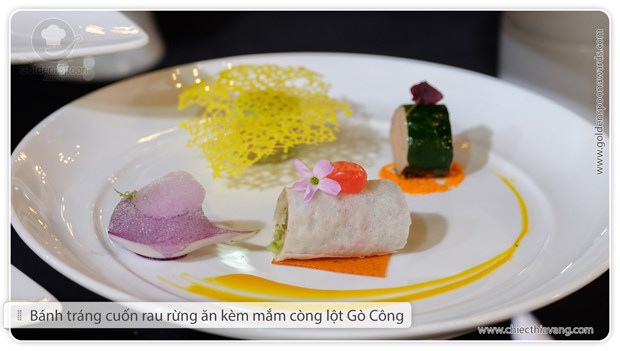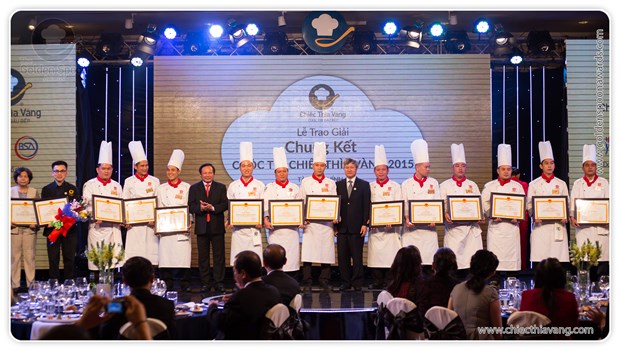Finding traditional and rustic dishes at
risk of being lost is difficult, but to be able to understand and tell its
story is even harder. It is a compulsory task and a condition for professional
chefs who attend the journey of the Golden Spoon contest.
For over a thousand years Vietnamese cuisine has followed
the principles of five elements, and the balance between yin and yang. Even
during family meals, our ancestors required using only the freshest
ingredients. Commonly meals should be included many vegetables, grains, herbs,
meat and fish. All dishes should be a great combination of all flavors: sour
and spicy; salty and sweet; crunchy and clammy; hard and soft.
Luckily, Vietnamese cuisine has always taken its roots in
nature and kept the balance between the delicious and nutritious. The challenge
for chefs today is whether to fuse Vietnamese cuisine with the elites of the
culinary world, or keep its traditional makeup as passed down through its
ancestors.
This important decision requires each chef of the Golden
Spoon contest to possess knowledge about nutrition and the capacity to select
fresh and natural ingredients grown without additives or chemicals that may
alter the taste and harm our health. The chef must also provide a balanced menu
without overuse of oil and frying, so that the dishes retain their health
benefits. They should think of creating menus with dishes that can increase
overall awareness for eating wholesome.
All the dishes that achieve these criteria
will contribute to improve general health conditions for the public. Humanity
is a resource and the talent of its people is national spirit. This strength
must be fostered and built up. In order to become a rich and sustainable
country, we must take care of the health of our people, especially by building
a young generation full of energy to take this forward.
The Golden Spoon contest not only takes
requires delicious flavors as the key to a great Vietnamese dish, but also
expects its nutrition to be taken seriously and represented in modernizing the
cuisine. As our country develops, our society is more and more concerned with
the development of its cuisine, and attention must be paid to the long-standing
healthy feel it has always possessed. This important mission is put on the
shoulders of professional chefs.
3. Internationalize Vietnamese dishes through
decoration, and present them with luxurious appeal.
In August 2007 outstanding marketer Mr. Philip Kotler came
to Vietnam he held a seminar titled New
Marketing for the New Era. Here, he imparted that, “Each country should
exploit its own strengths to market its image. China is considered as the
world's factory. India as global offices. Why can’t Vietnam, with its
reputation for a diverse culinary art with abundant food sources, become a food
kitchen or warehouse of the world?" This most excellent suggestion
inspired an idea of integrating with the rest of the world through transforming
the power of culinary culture into economic potential.
To implement this idea is not easy. It requires a
professional development strategy and human resources with chefs who have
sufficient knowledge and talent at level of artisans. Chefs must not only have
the ability to design a purely Vietnamese menu using only all-natural
ingredients, they must do so in-line with world food trends and then present it
in such a refined and elegant was.

The presentation skills of Binh Quoi I Tourist Area’s chefs (semi-final round in the 2015 Golden Spoon contest).
Applying decoration or presentation techniques for dishes
or party table by using color, shape, highlighted spot and refined details or
creating a harmonious combination actually have a big impact on the taste of
both national and international diners. These skills will help the Chef
contribute to make Vietnam Cuisine blooming and appear in the menus of
international party table and be more perfect in national party that containing
both country spirit and beyond national borders. In line with the purpose of
internalizing Vietnam Cuisine, Golden Spoon with luxury Ly 's Horeca porcelain
products are really building a solid foundation for a long journey.
4. Honor the talent of chefs, restaurants and hotels that contribute to the
enrichment of Vietnamese cuisine.
To
transform cuisine into an art we need chefs and experts that understand about
nutrition, know how to identify naturally raised ingredients, prepare and cook
authentic dishes that retain their tradition know how to process foods but
still remain true to the roots of the recipe. On top of this, the chefs must
also possess the talent to present such authentic dishes in a style that is
modernized; single serving and enticing to all international palates.
The champion and runner-up
stand on the victory platform at the Golden Spoon contest with the coveted
Chef’s Cup and many valuable prizes. However, it is of more import that the competition
also honors the gathering of all its contestants. They are the ones who with
the right passion and heart that will lift up Vietnam’s cuisine to be on par with
the rest of the world’s greatest food destinations.

Awards ceremony of the 2015 Golden Spoon contest.
5. Develop a brand for Vietnam’s cuisine and turn it into a
national source of tourism that increases economic development and enhances general
welfare.
Over the years Vietnamese dishes appear continuously in
the ranking of Asian delicacies and throughout the world. Dozens of well-known
Vietnamese restaurants in Saigon, Da Nang and Hanoi are ranked in the list of
the top luxury restaurants in Asia. The list grows longer with more and higher
positions. With such advantages, Vietnam can choose to target the emotions of
its travelers through its food, as national pride and spirit shines through.
There are already several parts of country’s tourism in
development, such as its geography, landscape, history, culture and
spirituality, but the value of food culture can and should be enhanced
immediately. It has the capacity to create immediate memories and bring
emotional hospitality to tourists. Once foreign visitors love a dish - whether
it's a dish in a luxury restaurant or a tasty bowl of Pho from a shop in an
alley - it has the great potential to make tourists return.
Turning traditional and rustic delicacies
in Vietnamese cuisine into a national brand is not only a dream, but it must
become reality. In order to do so, we must have a targeted plan of action.
First of all, standardize foods in both quality and form so that any foreign
visitors coming to Vietnam or elsewhere around the world, while enjoying the
fried spring rolls, raw spring rolls, snakehead fish sour soup, “bánh bèo” cake, “bánh khọt” cake can feel all delicious, healthy and exquisite in
Vietnam cuisine. This isn’t the work of any single chef, but a uniform
alignment with a macro management at the national level. The most important
part is to have an industry of modern cuisine, in tune with the development
trends of the world. It is a total development plan from the physical, cultural
and spiritual qualities of Vietnamese cuisine. Alongside, the nation’s budding
chefs and talent will be the driving force of one of Vietnam’s best attributes:
its food.
By The Golden Spoon Award